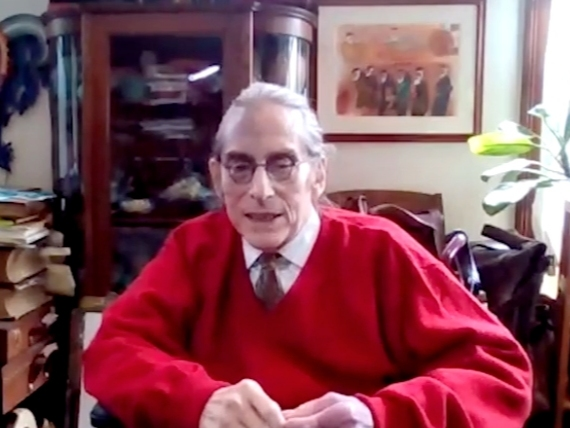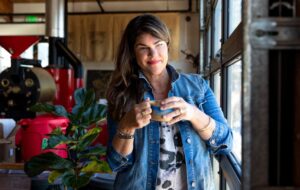Media: Rabbi Douglas Goldhamer is featured in the premiere episode of the web series “Sign of the Times.” (Silver Screen Studios)
Jonah Meadows,
Patch Staff
Verified Patch Staff Badge
Posted Thu, Sep 30, 2021 at 1:28 pm CT
Updated Thu, Sep 30, 2021 at 3:01 pm CT
SKOKIE, IL — A local rabbi who has spent nearly a half-century leading the Chicago area’s only synagogue for the deaf community is the subject of the premiere episode of a new web series.
Rabbi Douglas Goldhamer came to the Chicago area in the early ’70s at the invitation of the Hebrew Association of the Deaf, a group of about 11 families around Skokie who aimed to turn the group into a full-fledged synagogue.
Goldhamer, 76, of Evanston, had become fascinated by the “dancing of the hands” while at seminary and picked up sign language quickly. He became the founding rabbi of Congregation Bene Shalom in 1972.
“First we wanted to show that deaf people can do anything that hearing people can do, except hear. After we showed that, more and more deaf people joined our congregation,” Goldhamer told Patch.
“What we did was create a revolution. What is the revolution? That all people — just like the revolution in the ’60s — all Black people, white people, Indian people, Chicano people, Jewish people, all people are welcome to assume leadership roles in our congregation,” he added.
Goldhamer said that Christian congregations were ahead of Jewish ones when it came to integrating people who cannot hear into their communities. Jewish religious law, he said, relegates deaf people to a secondary position where they cannot have leadership roles and are not called upon to complete bar and bat mitzvahs.
“The Talmud is very clear when it says ‘the deaf person,’ ‘the woman,’ ‘the mentally disabled person,’ — deaf, woman, mentally disabled people — physically disabled, hunchback people, they cannot lead the congregation from the bimah,” Goldhamer said.
“A deaf person doesn’t have mental competency, that’s what it says in the Talmud,” he said. “We said, ‘Bullshit. The deaf person has mental competency as much as a hearing person. Just do your best. Focus on God, focus on the Jewish religion, focus on helping your neighbor.'”
Goldhamer said the prevailing view about disability and divinity has evolved in recent decades.
“If you’re disabled, God wanted you disabled, and if God wanted you disabled, then God did not want you to stand on the bimah and become a rabbi,” he said, describing the mentality when he started at Bene Shalom. “But over the years, that myopic thinking was discarded, and at the end of a number of years deaf people from all over the country were embracing our newly formed congregation of deaf and hearing.”
Today, deaf people can hold leadership roles in Reform and some Conservative synagogues, he said, but there are no Orthodox rabbis who are deaf.
Back in 1972, Goldhamer was discussing his new congregation in a Walgreens when he was overheard by Harry Trigg, a longtime local television executive and program manager at WMAQ-TV at the time. The rabbi said Trigg told him he had the face of a newscaster and invited him to sign the news.
“I said, ‘Uh, let me think, is the pope Catholic? Yes, I’d like to be a newscaster,'” Goldhamer recalled. “I said, ‘I’d rather be a rabbi, but since I’m not earning a lot of money, yes, I would like to be a newscaster part time, but full time would like to continue to be a Jewish minister integrating the Jewish deaf into Judaism so the Jewish deaf and the Jewish hearing can work together in manifesting the laws of Talmud, the laws of Torah and the laws of decency.’
“It doesn’t matter if you’re deaf, doesn’t matter if you’re in a wheelchair, doesn’t matter if you’re blind, doesn’t matter if you can’t walk well. What matters is if you try your best to work for the greatness and goodness and power and presence of God. ”
Goldhamer spent about four years as a newscaster there, bristling at the requirement that he wear a suit jacket and refusing entreaties to don hand makeup to cover up a scar from a botched radiation treatment he underwent as an infant. He said the station received many letters from viewers who were uncomfortable with his scarring, and he believes that led to his firing from the station.
Media: Tiffany Woolf is the founder and co-creator of Silver Screen Studios. (Silver Screen Studios)
After spending time as an assistant professor at Gallaudet University, where classes are taught in American Sign Language, he returned in 1992 to found Hebrew Seminary, the world’s first rabbinical school for both deaf and hearing. At least 20 deaf rabbis have graduated from the school. When it started, there were no deaf rabbis anywhere, including in Israel, Goldhamer said.
The rabbi’s work recently caught the attention of Tiffany Woolf, who has produced several web series focused on older adults since founding Silver Screen Studios in 2017. After working in social work and public relations, she began telling seniors’ stories.
“My whole goal for this when I first picked up the camera was: Gosh, if anybody can be inspired after watching these films to call their grandparents, or their parents, or their aunt, or people even they know in their neighborhood and just have conversations with them, that would be a win,” Woolf told Patch.
“If folks could be inspired to have people of other generations, if they could maybe, instead of watching the Kardashians for inspiration, call their grandparents and capture their stories and find out your roots and your heritage and it’s just so meaningful,” she added. “It’s such a two-way exchange. It’s great for older generations to be asked. So many people aren’t asking them anything, and they are the keepers of so much wisdom and history and knowledge that we should be going to them about resiliency and about history and what advice of how to live a good life.”
Goldhamer is featured on the episode of “Sign of the Times,” Woolf’s fourth series produced with co-creator Noam Dromi and the first she has directed. Episodes of each series run up to about 10 minutes, with up to seven episodes per season.
“We’re interviewing older role models that, even at their age, are still trying to challenge the status quo and make the world a better place and be advocates and activists for human rights, and I like to say Rabbi Goldhamer is advocating for kindness,” Woolf said.
“I thought that was kind of the beautiful irony of the whole story was that here he faced trauma as a child, with the botched radiation at only 30 days old, which really affected his whole life with his burned hand and having great pain and feeling different,” she said. “Then the beautiful irony is he uses his hands to sign for other, maybe what would have been deemed marginalized communities.”
In addition to his work as a rabbi and a professor, Goldhamer is also an accomplished painter.
“I paint about two hours a day,” he said. “I love painting. It inspires me to learn Judaism even more, and when I learn Judaism, it inspires me to paint even more. Painting and Judaism to me are like brothers and sisters.”
Since the coronavirus pandemic has replaced the congregation’s in-person religious services with services held over video-teleconferencing software, Bene Shalom has been able to extend access to people across the continent.
“More and more people have joined our congregation in the past couple years, deaf people from Winnipeg, deaf people from Vancouver, deaf people from California, deaf people from Halifax, deaf people from Boston and New York, parents of deaf people,” he said. “It was and it is enormously inspiring and that how I know, again, I’m called to do this work by the Lord, our God.”
But even though the shift to remote services has expanded the reach of Congregation Bene Shalom, it has been falling short of its budget.
An online fundraising campaign remains about $20,000 short of its goal to fill its budget shortfall, as of the end of September. Funds are needed to cover the cost of basic necessities, interpreters, programming and a free community food pantry.
“We still need a lot of money,” he said. “Because most people who hear are much more wealthy than people who cannot hear, because they have much better jobs.”
Source: patch.com/illinois/skokie/revolutionary-skokie-rabbi-deaf-congregation-inspires-series





